Printed in the United States of America 18 17 16 15 4 3 2 1 The Crab Orchard Series in Poetry is a joint publishing venture of Southern Illinois University Press and
. This series has been made possible by the generous support of the Office of the President of Southern Illinois University and the Office of the Vice Chancellor for Academic Affairs and Provost at Southern Illinois University Carbondale.
copyright Janet Biehl; all rights reserved Library of Congress Cataloging-in-Publication Data
[Poems. Selections]
Salt moon / Noel Crook.
p. cm. (Crab Orchard Series in Poetry)
I.
Title.
PS3603.R6647A6 2015
811'.6dc23 2014034608 Printed on recycled paper.  The paper used in this publication meets the minimum requirements of American National Standard for Information SciencesPermanence of Paper for Printed Library Materials, ANSI Z39.48-1992.
The paper used in this publication meets the minimum requirements of American National Standard for Information SciencesPermanence of Paper for Printed Library Materials, ANSI Z39.48-1992.  For Will, Charles, Mary, and Richard,
For Will, Charles, Mary, and Richard,
and for my mother, who read to me
Acknowledgments
Grateful acknowledgment is due to the editors of the following publications, in which some of these poems first appeared, sometimes in different form:
The Atlanta Review: Smith Canyon
Birmingham Poetry Review: Field-of-Flowers
Crazyhorse: Coyotes
Great River Review: Owl
JAMA: The Journal of the American Medical Association: Piano Teacher and Storm
Main Street Rag: Matilda Lockhart, Age 13, Abducted by Comanches
The Normal School: Lice and Skull
One: Big Sky
Poetry East: The Sunday Swim, Comanche Trace
Potomac Review: Reading Ovid at Buzzard Rocks
Raleigh Review: House, Orions Belt, and Prey
River Styx: The Horse Graveyard and On the Road to Agra
Shenandoah: Turners Suns (as J. M. W. Turners Suns)
Smartish Pace: Notes from a Salt Flat Prisoner
Southeast Review: Crows
Tar River Poetry: The Slaves (as Keeping the Bones) and The Twins
Wake County Physician: Mercy (as Job)
Walter: Dog Heart
War, Literature and the Arts: War Photo Notes from a Salt Flat Prisoner was printed again in
Best New Poets 2014.
Smith Canyon appeared again in Perfect Dragonfly: a Commonplace Book of Poems Celebrating a Decade & a Half of Printingand Publishing at Red Dragonfly Press (Red Dragonfly Press, 2011), and in the anthology What Matters (Jacar Press, 2013). The Twins was printed again in Tar River Poetry, 30th Anniversary Issue. Several of the poems in this collection were included in the chapbook Canyon (Red Dragonfly Press, 2010). Many thanks to Amy Fleury for choosing this book and to Jon Tribble and everyone at Crab Orchard Review and Southern Illinois University Press for their keen and patient editing of it. Deepest gratitude to John Balabanpoet, teacher, mentor, and friend extraordinairefor his unflagging humor and guidance throughout the writing. Thanks also to Betty Adcock, whose poems taught me before I had the good fortune to know her, and to Claudia Emerson, Antony Harrison, Dorianne Laux, Peter Makuck, Tim McBride, and Joseph Millar for their generosity, kindness, and invaluable advice.
Thanks to my teachers, especially Edwin Wilson, Lee Potter, and John Morillo, and to my cohorts in the North Carolina State University MFA program and the Wayward Ladies Poetry Circle, Eloise Gilster, Elizabeth Jackson, Kelly Michels, Nora Shepard, and Shannon Ward. And with abiding appreciation to my family, Eileen and Phyllis Vance, Bill Crook, and, mostly, my mother, Eleanor, and my sister, Elizabeth Crook, for their love and tireless encouragement along the road.
DARK COUNTRY
Big Sky
Little sky in these Carolina woods, more greens than you can number, above us crooked rafters of washed-out blue. Here ten kinds of bird all hollering at once, ten songs of secret nest and sifted light. Here we are hemmed in by tendrils, socked in, loblolly so high and thick even the pastures a cracked sarcophagus where you have to look quick to locate the moon. I want the western sky of my girlhood, purple as lupines and longing.
Unligatured wind that will hollow your bones like the kiss of a boy at sixteen who flattened me over the hot hood of his Ram truck. Give me sun-stunted scrub oaks rooted in rock and shaped like bad hearts; the summer a mountain lion ambushed an appaloosa colt by the barn and two bottle-fed backyard deer, their bones dragged to the dump to be picked clean and sun-whitened. Give me found flint arrowheads the color of lost rivers, the barbed-wire fact that Comanche girls liked burning the captured fawn slowly to death before breakfast; scorched earth, nights rampant with stars, the Pleiades fleeing, an orange skiff of moon going down fast into black swells of hills. Sunrise the colors of cataclysm, the singular solace of the canyon wrens, their strafed ululations, and, in a cartwheel of azure, the lone buzzard wheeling and waiting.
Owl
All day he stays hidden, his hole deep in the grizzled oak that leans and reaches past our bedroom window. We find his leavings in the pansy bed: dry orbs of bone and fur laced with tiny xylophones of vertebra, little femurs, sharp-chinned skulls.
Some nights I make him out, obscure as a thumb-smudge on his porch of bald white branch, a small dark dome against the moon. We sleep beneath himbeneath a shell of shingle and plaster in a nest of down from other birds, and surely our sounds (the rustle of bedclothes, the sighing of dogs) reach his owl-ears, mix with the sweet scrabble of mice in the woodpile. He speaks to the night in round vowels that fur my dreams, but if I could I would call him to me some dark midnight, tell him how once I heard the cry of something small from the woods behind the barn a low pain-whistle that spiked my blood how that night from the hole of my sleep I searched for it, briars tearing my nightgown, the landscape topsy-turvy with my running. And he would tell how he knows death as swoop and smack of beak, the crush of small bones, the kick of the whole mouse in the craw.
The Slaves
That first spring in the old farmhouse we call ours, I found them, their stones strewn in the wooded corner of the mares pasture, sloping into barbed wire, blackberry thicket, toward the creek belowa few uncertain mounds nudged by roots of loblollies, shifted by erosion. They are nothing like those ordered rows of Faithful Wives, Beloved Sons in the Zion churchyard down the road, but the earth remembers with its smattering of March narcissus.
Who in secrecy or careless grief dug the bulbs, dirt-smelling and heavy as promises, from the neat ring around the backyard oak? Summers, our children use the pond washstone for a diving board, their toes grip its curved surface smoothed by calloused hands and sheets and petticoats. We show visitors the old quarters: Seventeen slept here, we say. The bunks must have been three high. I should tend them, these jumbled dead, straighten their stones, smooth their cracked turf, put up a small fencethe kind found on country drives past old homeplaces that confine death to a squarebut there is no figuring where their heads lie or even where the graves end. Perhaps string wind chimes from pine branches, but those dull tones might be unbearable. No, let them have their confusion of peepers in the spring, in the fall the bay of hunting dogs, the knock of horse and deer hooves over their dark rooms.

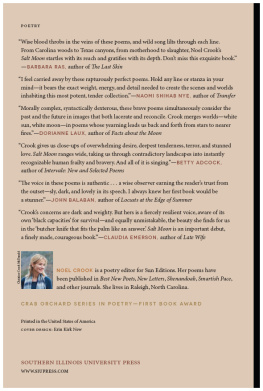
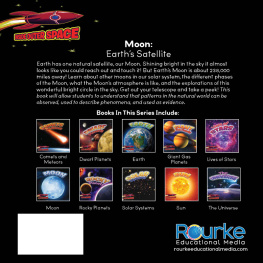

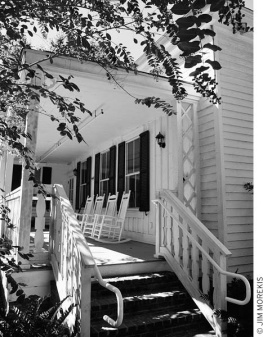
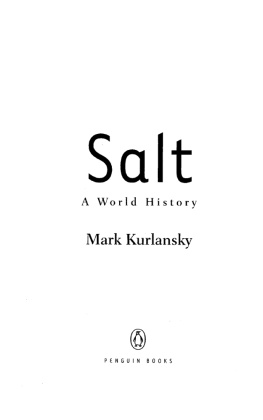
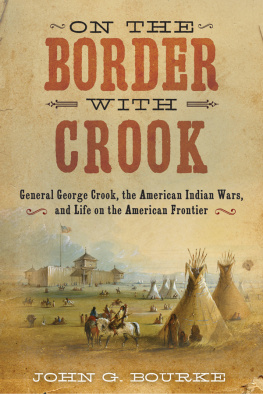
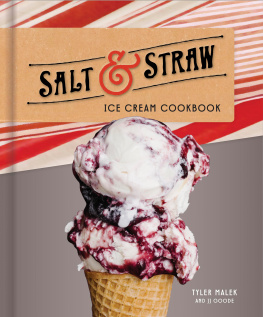


 The paper used in this publication meets the minimum requirements of American National Standard for Information SciencesPermanence of Paper for Printed Library Materials, ANSI Z39.48-1992.
The paper used in this publication meets the minimum requirements of American National Standard for Information SciencesPermanence of Paper for Printed Library Materials, ANSI Z39.48-1992.  For Will, Charles, Mary, and Richard,
For Will, Charles, Mary, and Richard,